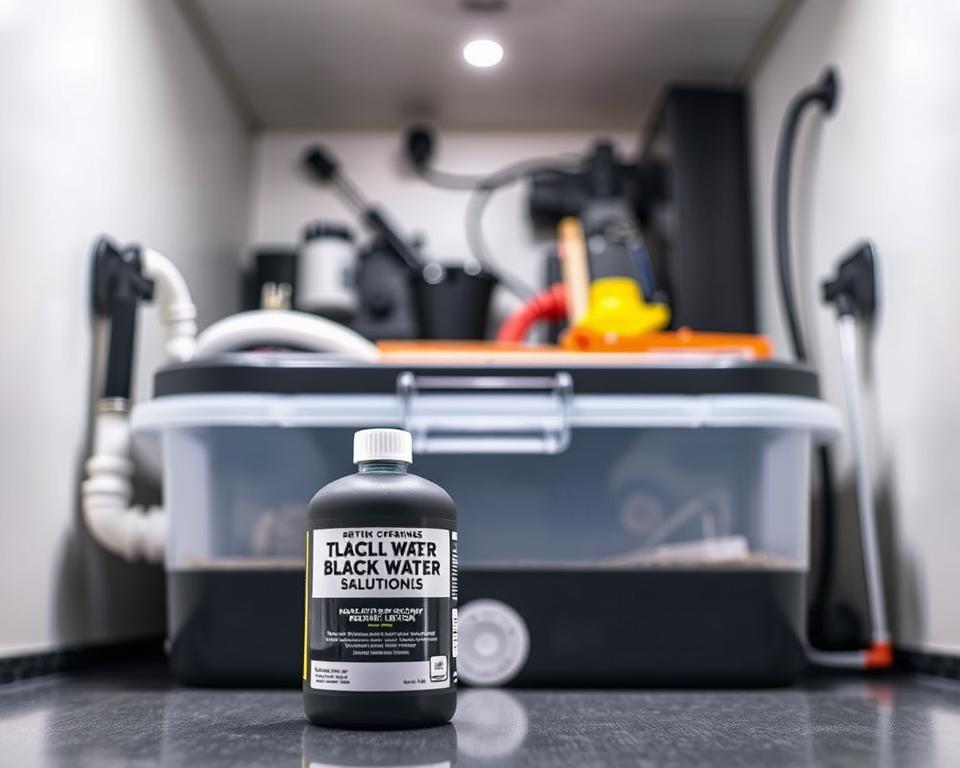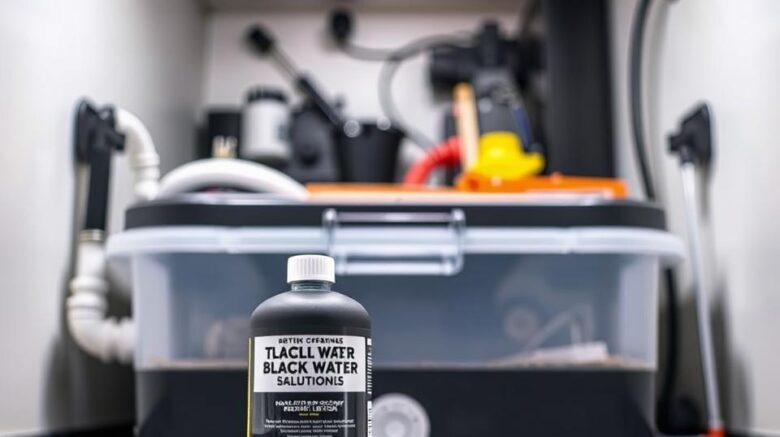RV Black-Water Pump: Essential Maintenance Tips
Are you sure your motorhome’s black water pump is up to the task, or could it produce campsite headaches? Keeping your motorhome’s waste system in peak form is imperative. It wards off bad smells, blockages, and hefty fixes. We’ll share key advice to ensure your sewage pump runs seamlessly, making your travels serene.
Grasping Your RV’s Plumbing System
The RV plumbing system is integral for any smooth journey. It breaks down into two main parts: the black water system and the gray water system – RV septic pumping. The black water system holds waste from the toilet, while the gray water system deals with wastewater from sinks and showers.
The systems feature drain lines that lead to different tanks, designed for efficient waste management. Each tank has a vent to block gas from building up, keeping the operation is safe and scent-neutral. Proper waste management in an RV is key to forestall leaks or bad odors. By familiarizing yourself with both black and gray water tanks, RV owners can maintain and manage waste better.
Grasping how your RV’s plumbing works allows early detection of issues early. Regular maintenance ensures smoother travels for everyone. Staying ahead with your RV’s plumbing system secures reliability during your travels.
Types of Tanks
Exploring RVs involves being aware of the different tanks. Each one is vital to your RV’s performance, calling for regular upkeep.
The fresh water tank stores consumption water. It’s essential for a comfortable RV experience.
The gray water tank receives sink, shower, and other non-Septic wastewater. Overseeing this tank keeps your RV clean while traveling. The black water tank, on the other hand, contains toilet waste. It needs frequent emptying and meticulous maintenance to avoid issues.
By recognizing the fresh, gray, and black water tanks, RV owners can effectively manage their systems. This preparedness and ongoing maintenance secure smooth running of the waste management system.
Black Tank Mechanics
The working of the black water tank is key in RV waste management. It receives waste from the toilet via a gravity-fed system. Upon flushing, waste and water are sent into the tank, to be stored until removal is necessary. It’s important to keep water levels optimized in the toilet to sidestep solid waste buildup.
Grasping how RV waste tanks function can prevent clogs and odors. Without proper care, solid waste hardens, leading to blockages and emptying difficulties. Thorough tank flushing techniques are essential to preventing these issues, ensuring smooth functionality.
Frequent inspection of tank mechanics is advised for RV owners. This includes watching flushing methods and maintaining adequate water flow. Practicing these essentials facilitates efficient tank maintenance, heading off expensive fixes later.

Essential Maintenance Tips for Your RV Black Water Pump
Carrying out regular maintenance on your RV’s black water pump is essential. Start by selecting RV-safe toilet paper to lessen clogs and improve flow. A comprehensive flush can remove waste and diminish bad smells. Consistently cleaning the tank helps prevent residue buildup, ensuring your RV fresh and comfortable.
Run routine inspections to monitor your pump’s condition. Watch for any signs of wear or damage that could reduce its function. Using specialized tank treatments, like those from All in Sanitation, can significantly raise both performance and cleanliness. Adhering to these tips can lengthen your pump’s life and improve your RV’s living conditions.
Select Camper-Safe Toilet Paper
Maintaining your RV’s black water system demands crucial measures. One critical move is using RV-safe toilet paper for clog prevention. This dedicated product breaks down quickly in water, perfect for RV sanitation systems.
RV-safe toilet paper is vital for tank maintenance. It dissolves fast, avoiding blockages from slow-decomposing materials. This improves waste disposal efficiency and keeps the plumbing clear.
Pick brands labeled as RV-safe when buying toilet paper. These products reduce clog risks and boost your black water tank‘s lifespan by sidestepping buildup. Continual use ensures a stress-free camping experience, absent plumbing troubles.
Flush the Tank Thoroughly
Rinsing completely your black water tank is key for effective waste management in your RV. To aid waste movement, confirm the toilet bowl is adequately filled before flushing. Many RVs are equipped with built-in tank flush systems to make the process more effective. For RVs without this feature, utilizing tank rinsers that attach to the sewer outlet offers a good alternative.
Proper tank flushing supports waste removal and prevents solid accumulations and bad smells. Adhering to this process delivers your RV stays free of odors, making your travels more pleasant. A dedication to regular and complete tank flushing will improve hygiene and the overall condition of your RV’s plumbing system.
Keep Tanks Clear with Steady Cleaning
Keeping your RV’s black water tank free of buildup is key for its efficient function. Consistent cleaning washes away lingering waste inside the tank walls. This means washing well with water and using specific RV tank cleaners for tough deposits.
By cleaning diligently, you halt odors and lessen clog risks. A well-maintained tank makes RVing better and helps your plumbing last longer. Add tank maintenance into your routine to guarantee smooth travels.
Using the Right Chemicals for RV Black Water Pump Maintenance
Choosing correct chemicals for RV black water pump maintenance is vital for managing waste and minimizing smells. Many RV enthusiasts favor enzyme-based RV holding tank treatments. These products feature good bacteria to liquefy solids and cut down bad odors.
Steering clear of harsh chemicals is critical to prevent damage to your plumbing. Such substances can corrode pipes, leading to high repair bills and diminishing your RV enjoyment. Utilizing safe chemicals for odor control secures your tank and pump’s longevity.
Keeping your RV black water tank in excellent order boosts your travel experience. Using the right holding tank treatment regularly ensures your system works well.
Timely Tank Emptying
It’s vital to empty your RV’s black water tank at the proper level for effective disposal. Plan to dump when the tank is about two-thirds full is sensible. This sidesteps solid waste buildup, delivering a simpler emptying process.
Emptying at designated stations is critical for safe, eco-friendly waste handling. It’s important to monitor the tank‘s levels closely. Letting it max out can create clogs and make disposal more difficult.
Proper timing and methods are crucial for hygienic waste management and can increase your plumbing’s life. Staying vigilant and caring for the system well guarantees a pleasant RV living experience.
Seal Checks & Care
Checking seals around the toilet and tank is critical for leak prevention. Over time, these seals might wear, leading to odors and potential harm. A thorough inspection will identify any wear or damage. Finding issues early enables quick replacement to guarantee a secure connection and odor-free RV.
Holding a bit of water in the toilet bowl aids in preserving seal condition. This protective habit is essential in RV seal upkeep. It extends the seals’ life, preventing leaks and foul odors.
Routine seal maintenance can forestall pricey work later. By paying attention to seal health, RV owners secure a pleasant journey.
Long-Term Care Suggestions
Scheduling professional servicing for your RV at least once a year is wise, particularly for black water tank care. This strategy supports early problem detection and upholds your plumbing system’s integrity.
When setting your RV for storage, entirely clean and empty the black water tank first. Think about antifreeze to prevent damage from remaining water during cold seasons. Following this practice is important for maintaining the system, guaranteeing it’s ready for your next adventure.
Frequent audits and preventive actions are essential to lengthening your sanitation system’s life. Observing connections, hoses, and seals delivers smooth operations. This mindset enhances your RV experience, making it enjoyable all year round.
Making sure your RV’s black water pump is well-maintained is essential for a stress-free camping journey. By following the maintenance tips shared, you can retain your black water system running smoothly. It’s important to focus on consistent tidying, employing correct flushing methods, and picking appropriate chemicals for waste management.
By satisfying these maintenance requirements, you will sidestep unpleasant odors and blockages. This also prolongs your RV plumbing system’s durability. Proactive care of the RV black water pump leads to more time enjoying the outdoors, minus potential setbacks.
Remember, proper upkeep is key next time you gear up for an outing. It’s not the highlight of RV ownership, yet it significantly betters your travel experience.
